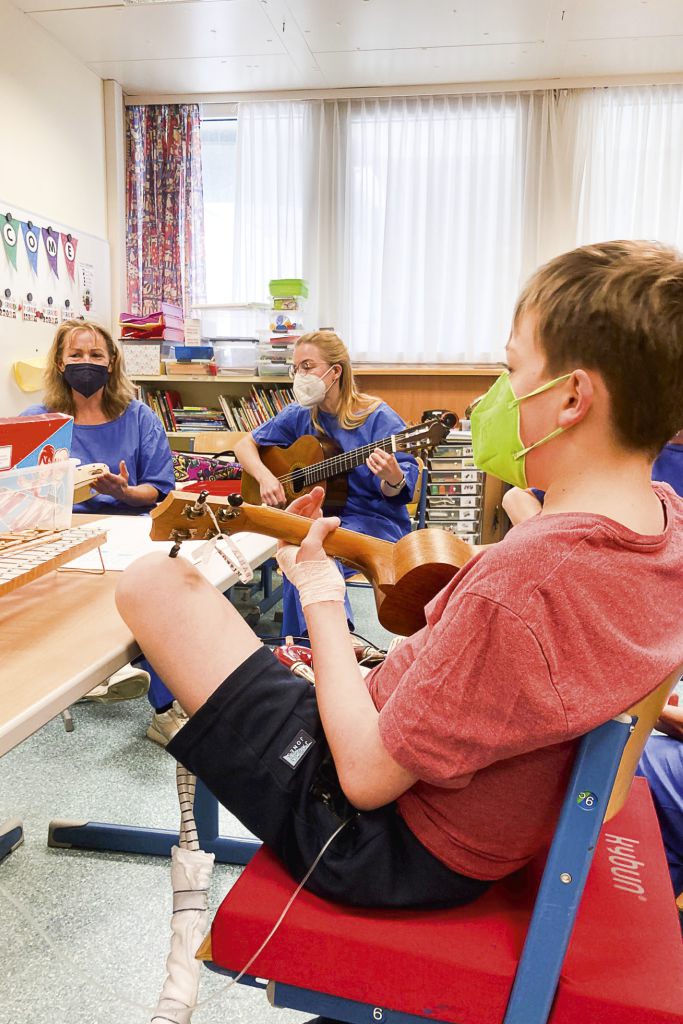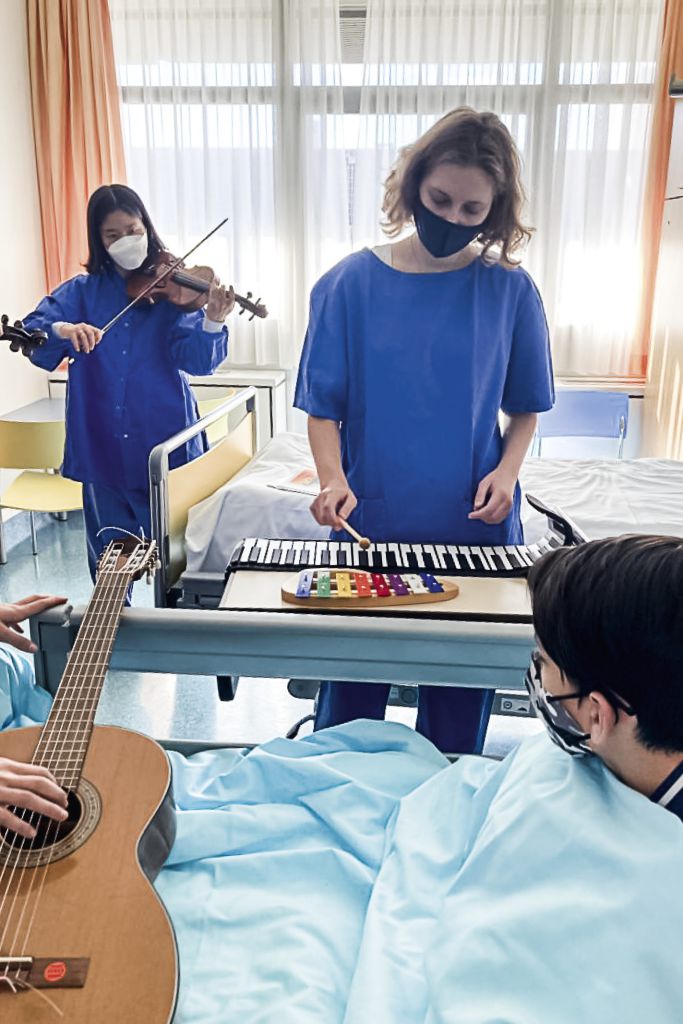“Music wafting through a hospital room; I hadn’t experienced anything like it before.” A student1
Universities bear social responsibility across all of the areas in which they work, with academic knowledge being closely tied to a focus on innovative policy and social commitment. Influencing society as a whole and bringing people into contact with music are anchored in the Development Plan of the mdw. And in this context, an important concern of our music education-focused departments is to train tomorrow’s educators such that those who make music together with them are placed front and centre along with their needs and potentials and in their full subjectivity. Didactics that are sensitive to heterogeneity and take developmental logic into account can support such efforts.

“We’ve learned: in our setting, too much structure is not helpful.” A student
At the Comprehensive Center for Pediatrics (CCP) of the Medical University of Vienna (MedUni Wien)/Vienna General Hospital (AKH), which employs a network of experts specialised in pregnant individuals, children, and adolescents, it has proven possible to establish a music-making workshop with a focus on instrumental education as part of the hospital’s school for young long-term patients. On the basis of the “Your Smile” workshops given by neurologist Vito Giordano, the winter semester of 2021/22 witnessed the launch of a research-guided music-making workshop 2led by Beate Hennenberg in cooperation with music physiologist Matthias Bertsch. Important additional cooperating partners are the teachers for Wards 8 to 11, namely Susanne Mauss, Nadine Konrad, and Elke Huber-Lang, as well as the two regularly employed instrumental music educators Anna Leisser and Verena Grundner and the two academic assistants Kathrin Fabian and Teresa Müllner. Donations by the CCP made it possible to purchase several high-quality instruments and employ two mdw students for two semesters, thanks to which it has since been possible to hold regular music-making sessions two days a week with the three- to sixteen-year-old long-term patients.
“A true expansion of the notion of music-making spaces.” A student
The participating institutions are pleased with this exchange: “As head of the Comprehensive Center for Pediatrics at the Medical University of Vienna, I welcome this project’s cooperation with the mdw. Our institution supports the concept of research and teaching in the context of a music-making workshop,” says Angelika Berger. And Gerda Müller, the mdw’s Vice Rector for Organisational Development, Gender & Diversity, took action to fund two further positions for this project from resources earmarked for the project “Kunst und Gesundheit” (The Arts and Health).
“His surgeries prevent him from playing percussion instruments using his hands, but we’ve found a creative solution where he can play the tambourine with his foot while lying in bed. That visibly cheers him up—and when we play and sing the song of greeting, he plays along enthusiastically. I’m impressed by how his body and his various senses perceive the rhythm and how he gets active in a very creative way, is aware of his emotions, and thinks about the music itself.” A student
Music-making activities at the hospital school address the patients but also their parents and the school’s teaching staff. Preparations for each semester’s activities begin with a deep dive into the relevant literature—for which the databases of MedUni Wien’s library are available as one of the resources. In this mdw course, whose orientation is theoretical and reflective as well as practical and artistic, we seek to explore how the participating individuals perceive the activities that this music-making workshop entails. Interesting from a long-term perspective are above all the interprofessional learning processes that take place as part of the interactions between the various institutions’ participants—all of which could then lead back to the question of what additional music-making spaces might be created at arts universities and to which future strategies they might give rise.

“While the students do bring along concepts for this teaching unit, they’re flexible enough to leave their prepared structures in favour of lively learning together with their students.” A teacher
In the weekly music-making sessions held in the classroom or in the patients’ rooms, the mdw students acquire skills that put them in a position to engage with diverse approaches and structural openness. The focus of their work is artistic as well as educational and also involves elements from school-based music teaching where these are appropriate to the content being covered. Afterwards, in following up on each session, reflection and writing are just as important as is regular exchange.
“Our educational excursion outside the ward took us to the main AKH building and its protestant chapel, where we got to a look at and try out the organ. A lot of people had to approve this—but all of them recognised HOW IMPORTANT it is for him to learn new things and expand his radius. He looked around the chapel with interest and immediately discovered the small, rather inconspicuous organ. (…) He was a bit nervous, too, since he’d also prepared a statement on J. S. Bach. (…) I selected the C-Major Prelude because its metre comes very close to that of his ‘Berlin Heart’ [a device that supports heart function—Ed.].” A teacher
In the book Weltwissen der Siebenjährigen [The World Knowledge of Seven-Year-Olds], author Donata Elschenbroich contemplates what “social, motoric, practical life skills” a child or young person should have acquired and how an individual “panorama of educational experiences” can be made possible. Such contemplations serve to motivate our music-making sessions—for time is precious, with most of these children being in palliative care. And even so: in the children’s musical doings, their parents suddenly come to perceive them as experts and researchers. And the medical personnel, for their part, make sure whenever possible that the children can participate in these sessions. Degree papers are currently being written concerning several of the topics mentioned here.

